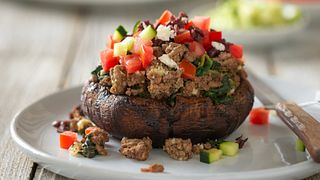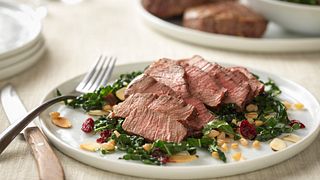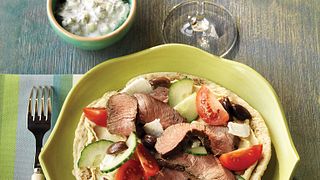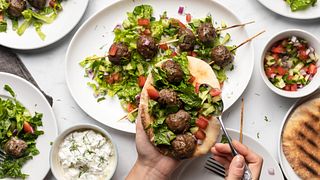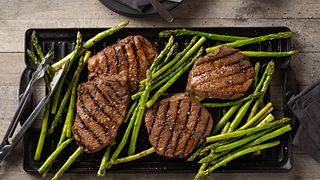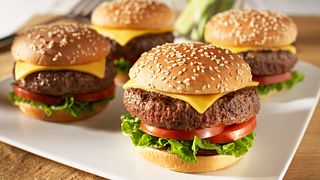Beef For Strength
Kim Larson, Registered Dietitian Nutritionist (RDN) and National Board-Certified Health & Wellness Coach (NBC-HWC) is owner of Total Health in Seattle. Using established science behind nutrition, fitness, health and wellness coaching, Kim encourages beef as an essential component to building a strong life.
The Connection between beef & Strength
Beef's nutrients, along with a healthy lifestyle, work to provide our bodies and minds with the fuel to be the strongest versions of ourselves. See beef's nutrients in action and learn how they can support mind and body strength at all stages of life.
"Eating high-quality protein sources, like beef, for example, is an important step towards good health. Beef contains all of the essential amino acids, including the amino acid leucine, that supports muscle recovery and rebuilding after resistance exercise. It’s great for repairing muscles." - Kim Larson, RDN, NBC-HWC, owner of Total Health
Kim At The Gym
"Eating a higher protein diet is now thought to help with weight management. More protein helps protect lean muscle mass and strength, as you lose weight - a key factor in weight loss combined with exercise. Protein takes longer to digest so it’s more satisfying and filling - which may also help to prevent overeating." - Kim Larson, RDN, NBC-HWC

Beef For Strength Research:
A wealth of research (1) has linked protein to favorable lifestyle markers such as healthy body weight and/or weight loss, maintaining and building muscle, and overall diet satisfaction. When you’re looking for ways to fuel your family, improve your health, manage your weight or satisfy your appetite, consider all that protein can do for you!
GEt Lean With Protein
When it comes to satiety, or feeling satisfied after eating, protein has
more staying power than carbohydrates and fat, helping to curb hunger
and the desire to eat.(1) Consuming a high-protein meal (containing at
least 25-30 grams of protein), particularly at breakfast, leads to improved
appetite control and satisfaction throughout the day, which could help
combat obesity.(2) Learn More
Protein Power
A growing body of nutrition science indicates that many people may benefit from eating more protein foods at every meal.(3) Currently, the majority of protein is eaten at dinner (about 42%). But a simple dietary change, increasing protein intake at each meal - rather than consuming the majority at one meal, may help you meet your optimal protein needs, improve satiety and preserve lean muscle mass. Furthermore, consuming 20-30 grams of protein per meal may optimize skeletal muscle synthesis.(2) Learn More
not all proteins are created equal
Animal proteins, such as lean meats, eggs and low-fat dairy products are complete, high-quality protein sources that contain all nine essential amino acids.(5-6) Plant proteins such as grains, legumes, nuts and seeds tend to lack one or more essential amino acids, and are thus considered incomplete proteins.(5-6) Research has indicated that consuming complete, high-quality proteins may help you meet your protein needs, improve satiety and preserve lean muscle mass.(2) Learn More
One Powerful Protein
Among the powerful combination of 10 essential nutrients beef is known for, protein may be one of the most notable. In fact, one 3 oz cooked serving of beef provides 50% of your Daily Value (25 grams) of this important nutrient—making it an excellent source! So let’s ditch those fad diets and consider how we fill our plates at each meal. It’s not only important to just get protein in at dinner or lunch, but to spread it throughout your day. This can really maximize the benefits above. Aim for 25-30 grams of protein at each meal and you’ll start to feel the difference.
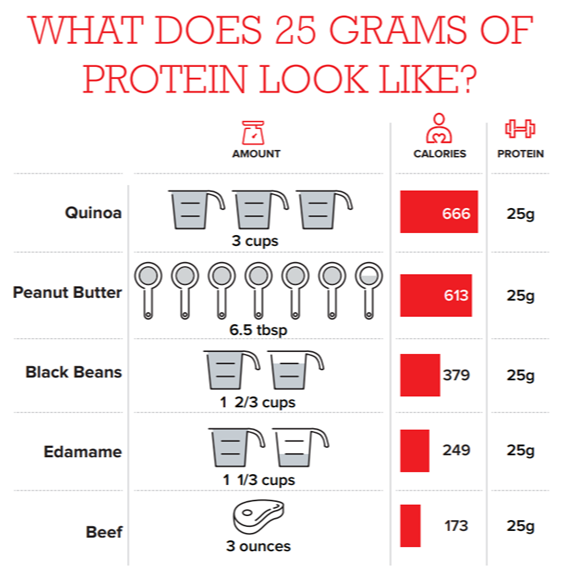
A wealth of research (1) has linked protein to favorable lifestyle markers such as healthy body weight and/or weight loss, maintaining and building muscle, and overall diet satisfaction. When you’re looking for ways to improve your health, manage your weight or satisfy your appetite, consider all that protein can do for you.
Feeling hungry? People who eat a higher-protein diet (about 30% of daily calories from protein) feel more satisfied, which may help prevent overeating.(2)
Protein helps support strong, lean bodies. Eating at least 4 ounces of high-quality protein from foods like beef at each meal provides your body with energy to lead an active lifestyle.(3)
Protein may help cut the fat. Research has shown exercise is more effective for weight management when paired with a higher-protein diet, and beef provides the amino acids necessary for building and replenishing muscles.(4)
Kim In The Kitchen
"When you are trying to improve your health and eating patterns, there's a place for every food, including beef. Using appropriate portions, choosing leaner beef cuts, and surrounding beef with plenty of whole grains, vegetables, fruits, nuts/seeds and olive oil can help boost the overall quality of nutrients in one’s diet. I recommend the Mediterranean-style eating pattern to many of my clients because it focuses on vegetables, fruits, lean proteins and whole grains in delicious and satisfying combinations that are great for kids and adults." - Kim Larson, RDN, NBC-HWC

How to get it done
Meal PLanninG for Moms

Kim recommends that to keep you and your family on track and fueled with the best nutrition, planning is the first step. She has developed an easy-to-use meal planner that will help you choose meals and recipes that make your family-work-kitchen balance easier, while also distributing your protein intake throughout the day.
7-Day Strength Meal Plan
Registered Dietitians, like Kim, have put together this 7-Day Meal Plan to take out all the guess work. It's detailed with what to eat, and when, including snacks! And there's lots of great beef recipes and ways for you to customize your protein, grain or fruit/vegetable choices. Enjoy your favorite foods and fuel your life, fitness and family.
MEDITERRANEAN Diet-Inspired Recipes
Incorporating lean red meat into a Mediterranean-style eating pattern has been show to help support heart health. Take a look at this collection of Mediterranean Diet-inspired recipes that feature fruits, vegetables, whole grains, nuts and seeds as well as a healthy dose of lean beef.
Getting to the Meat of the Mediterranean Diet:
"New research in the American Journal of Clinical Nutrition shows that lean red meat can support heart health when it’s included in a Mediterranean-style eating pattern. The Mediterranean style of eating is one of the healthiest ways to eat in the world. This is great news for my clients who enjoy beef and are interested in preventing heart disease and improving overall health." - Kim Larson, RDN, NBC-HWC
The Mediterranean diet is one of the world's most popular eating patterns. It is often described as being rich in fruits, vegetables, whole grains, nuts/seeds and olive oil, and lower in sweets, sodium and red meat. Interestingly, many Mediterranean countries eat about the same amount of red meat, or more, as the United States, but those countries pair red meat with more fresh vegetables and fruits, whole grains and healthy oils.
Recent research from Wayne Campbell, PhD at Purdue University asked if the overall health benefits and long-term heart health benefits long-known to be part of Mediterranean-style eating pattern could be achieved while including lean red meat. This published study shows that, YES, a Mediterranean-style eating pattern that includes fresh, lean red meat can support heart health. The study demonstrates that following a Mediterranean-style eating pattern that includes up to 18 ounces of cooked, fresh lean beef and pork per week – along with poultry and fish – is just as effective at improving certain heart disease risk factors (such as blood pressure and total and LDL cholesterol) as a Mediterranean-style eating pattern that limits red meat. Read the published study recap here.
Beef's Role in the MEDITERRANEAN Diet:
The Mediterranean-style eating pattern encompasses a wide variety of foods and flavors from the countries that surround the Mediterranean Sea. While the cuisines of each country differ slightly, they all have a few things in common. To build a healthy Mediterranean plate:
- Start by filling half your plate with fresh vegetables and fruits.
- Fill in the other half of your plate with lean protein and whole grains.
- Add dairy and healthy fats.
- Include these types of foods regularly and explore more Mediterranean flavors and food options:
Vegetables
Artichokes, Arugula, Beans, Beets, Broccoli, Brussels Sprouts, Carrots, Eggplant, Fennel, Kale, Leeks, Mushrooms, Mustard Greens, Onions, Radishes, Peas, Peppers, Potatoes, Pumpkin, Spinach.
Fruits
Apricots, Cherries, Dates, Figs, Grapes, Oranges, Melons, Pears, Pomegranates, Strawberries, Tomatoes.
Proteins
Lean Beef, Lean Pork, Lean Poultry, Fish/Seafood, Whole Eggs, Soy, Dried Lentils, Dried Beans and Dried Peas.
WHole Grains
Breads, Barley, Bulgur, Couscous, Farro, Oats, Polenta, Brown Rice.
Dairy
Cheese (Brie, Goat, Feta, Mozzarella, Parmigiano-Reggiano, Pecorino, Ricotta), Yogurt, Milk.
Fats
Olives, Olive Oil, Avocado, Nuts & Seeds.
Mediterranean Beef Meal Ideas:
As a Registered Dietitian Nutritionist and Board-Certified Health & Wellness Coach, Kim is passionate about the link between food and health. Her expertise is in helping people live longer, healthier and happier lives.
Kim is a lover of food and nutrition science, and a great resource for anyone looking to live life to its fullest. Visit TotalHealthRD.com to learn more about how Kim can coach you towards your health and wellness goals.
Kim has studied the research and seen the health results for her clients who follow the Mediterranean-style eating pattern. Read her February 2019 article on how this diet focuses on high-quality, nutrient-rich foods.
Beef Nutrition Research Notations
i Leidy HJ et al. The role of protein in weight loss and maintenance. Am J Clin Nutr 2015;101:1320S-9S.
ii Sayer RD, et al. Equivalent reductions in body weight during the Beef WISE Study: Beef’s Role in Weight Improvement, Satisfaction, and Energy. Obes Sci Pract 2017. Available at: http://onlinelibrary.wiley.com/doi/10.1002/osp4.118/full
iii Wycherley TP, et al. Self-reported facilitators of, and impediments to maintenance of healthy lifestyle behaviours following a supervised research-based lifestyle intervention programme in patients with type 2 diabetes. Diabet Med 2012;29:632-9.
iv McNeill SH. Inclusion of red meat in healthful dietary patterns. Meat Sci 2014;98:452-60.
v Roussell MA, et al. Beef in an Optimal Lean Diet study: e ects on lipids, lipoproteins, and apolipoproteins. Am J Clin Nutr 2012;95:9-16.
vi Roussell MA, et al. E ects of a DASH-like diet containing lean beef on vascular health. J Hum Hypertens 2014;28:600-5.
1. Westerterp-Plantenga MS, et al. Dietary protein, metabolism, and body-weight regulation: dose–response effects. Int J Obes 2006;30:S16-S23. • Paddon-Jones D, et al. Protein, weight management, and satiety. Am J Clin Nutr 2008;87:1558S-61S. • Paddon-Jones D, et al. Role of dietary protein in the sarcopenia of aging. Am J Clin Nutr 2008;87:1562S-6S. • Wolfe, RR. The underappreciated role of muscle in health and disease. Am J Clin Nutr 2006;84:475-82. • Devkota S, Layman D. Protein metabolic roles in treatment of obesity. Curr Opin Clin Nutr Metab Care 2010;13:403-7.
2. Leidy HJ, et al. Beneficial effects of a higher-protein breakfast on the appetitive, hormonal, and neural signals controlling energy intake regulation in overweight/obese, "breakfast-skipping," late-adolescent girls. Am J Clin Nutr 2013;97:677-88. • Westerterp-Plantenga MS, Luscombe-Marsh N, Lejeune MPGM, Diepvens K, Nieuwenhuizen A, Engelen MPKJ, Deutz NEP, Azzout-Marniche D, Tome D, Westerterp KR. Dietary protein, metabolism, and body-weight regulation: dose–response effects. Int J Obes 2006;30:S16-S23. • Leidy HJ, Bossingham MJ, Mattes RD, Campbell WW. Increased dietary protein intake consumed at breakfast leads to an initial and sustained feeling of fullness during energy restriction compared to other meal times. Br J Nutr. 2009;101:798-803.
3. U.S. Department of Agriculture, Agricultural Research Service. 2015. USDA National Nutrient Database for Standard Reference, Release 28. Available at: http://www.ars.usda.gov/ba/bhnrc/ndl.
4. Layman DK, et al. Dietary protein and exercise have additive effects on body composition during weight loss in adult women. J Nutr 2005;135:1903-10. • Mamerow MM, Mettler JA, English KL, Casperson SL, Arentson-Lantz E, Sheffield-Moore M, Layman DK, Paddon-Jones D. Dietary Protein Distribution Positively Influences 24-h Muscle Protein Synthesis in Healthy Adults. J Nutr. 2014 Jan 29.
5. O’Neil CE, et al. Food sources of energy and nutrients among adults in the US: NHANES 2003–2006. Nutrients. 2012;4:2097-120.
6. USDA/ARS, 2016. USDA National Nutrient Database for Standard Reference, Release 28.


